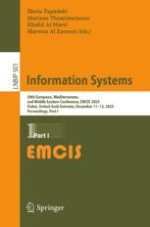This book constitutes selected papers from the 20th European, Mediterranean, and Middle Eastern Conference, EMCIS 2023, which was held in Dubai, UAE, during December 11-12, 2023.
EMCIS covers technical, organizational, business, and social issues in the application of information technology and is dedicated to the definition and establishment of Information Systems (IS) as a discipline of high impact for IS professionals and practitioners. It focuses on approaches that facilitate the identification of innovative research of significant relevance to the IS discipline following sound research methodologies that lead to results of measurable impact.
The 43 papers presented in this volume were carefully reviewed and selected from a total of 126 submissions.
They were organized in topical sections as follows:
Part I: Metaverse; blockchain technology and applications; digital governance; healthcare information systems; artificial intelligence;
Part II: Big data and analytics; digital services and social media; innovative research projects; managing information systems; smart cities.
